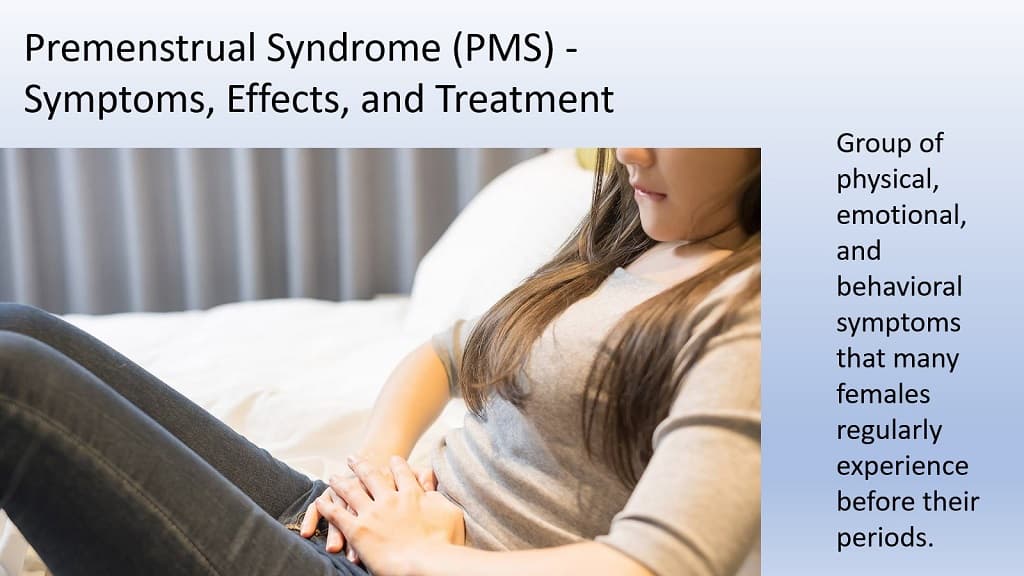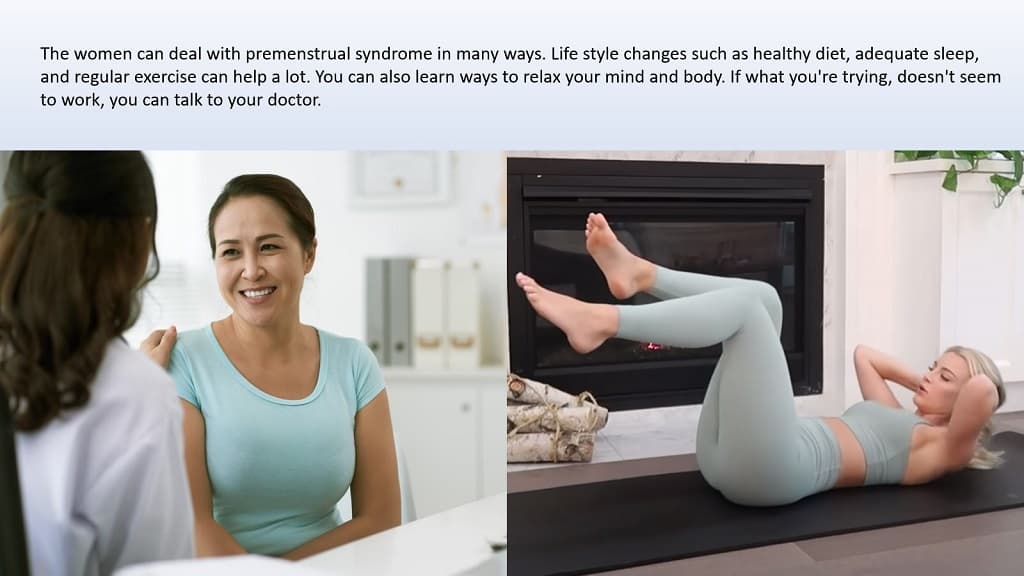Premenstrual Syndrome (PMS) is a group of physical, emotional, and behavioral symptoms that many females regularly experience before their periods. PMS can affect menstruating women of any age and the symptoms may vary from woman to woman. According to a study more than 90% of menstruating females report having some premenstrual symptoms such as bloating, headaches, and moodiness. Most of the symptoms are usually mild.

PMS Symptoms
The exact PMS symptoms and their intensity vary significantly from person to person, and even somewhat from cycle to cycle and over time. Symptoms usually appear after ovulation, when your ovaries release an egg. Most people with PMS experience only a few possible symptoms, in a relatively predictable pattern.
Emotional or Behavioral Signs and Symptoms
More than 200 different symptoms have been associated with PMS. Common emotional and non-specific symptoms include stress, anxiety, trouble sleeping, headache, feeling tired, mood swings, heightened emotional sensitivity, and changes in interest in sex.
- mood swings and irritability or anger
- appetite and changes in appetite
- fatigue and difficulty falling asleep
- depressed mood and crying spells
- changes in libido (sex drive)
Physical Signs and Symptoms
With PMS, you’ll likely notice some physical symptoms as well
- muscle or joint pain
- headaches
- breast tenderness (breast pain)
- general fatigue
- temporary weight gain
- bloating (feeling like your stomach/tummy is full of air)
- acne and breakouts
- constipation or diarrhea

PMS Causes
While PMS is associated with the luteal phase (day 14–28 of the menstrual cycle and is characterized by changes to hormone levels ), the causes of PMS are not clear, but several factors may be involved. Hormonal changes during the menstrual cycle appear to be an important factor, with changing hormone levels affecting some more than others. PMS is more common in those who are in their 20s and 40s, have at least one child, have a family history of depression, and have a history of either postpartum depression or a mood disorder.
Possible causes or contributing factors include:
- Multiple endocrine factors (eg, hypoglycemia, other changes in carbohydrate metabolism, hyperprolactinemia, fluctuations in circulating estrogen and progesterone levels, abnormal response to estrogen and progesterone, excess aldosterone or antidiuretic hormone [ADH])
- Estrogen and progesterone can cause temporary fluid retention, as can excess aldosterone or ADH.
- Genetic predisposition
- Serotonin deficiency
- Magnesium and calcium deficiency may also be a possible factor
Serotonin deficiency is thought to contribute because women most affected by PMS have lower serotonin levels and because selective serotonin reuptake inhibitors (SSRIs), which increase serotonin, sometimes relieve PMS symptoms.
Premenstrual Syndrome Treatment
Limiting salt, alcohol, caffeine, and stress along with increased exercise is usually all that is recommended for patients with mild symptoms. For some, calcium and vitamin D supplementation may be helpful. Anti-inflammatory medications such as ibuprofen or naproxen may help with physical symptoms. In patients with more severe symptoms, birth control pills or diuretic spironolactone may be helpful.

Lifestyle changes
You can make lifestyle changes to ease pain and combat mood-related PMS symptoms.
- Healthy diet: Eating more of some foods and less of others can combat PMS symptoms. For two weeks before your period, eat less salty, fatty, and sugary foods and drink less caffeinated and alcoholic drinks. During your period, eat six small meals a day instead of three large ones. Or eat three small meals and three small snacks. Eating healthy is good for your mood and your gut. Breaking down food prevents intestinal problems such as constipation.
- Getting enough sleep: Getting enough sleep for at least eight hours can reduce feelings of irritability. Waking up and going to bed at the same time each day has the added benefit of synchronizing your internal clock, making you less likely to feel moody throughout the day.
- Regular exercise: Moderate cardio (running, brisk walking, cycling, or swimming) for 30 minutes a day can reduce stress and improve your mood. The benefits last longer than 30 minutes.
- Relaxation exercises: Yoga, meditation, and breathing exercises relieve stress and combat the irritability and sadness that often accompany PMS.
Antidepressants
Antidepressants, especially SSRIs, are used as a first-line treatment for severe PMS symptoms and also in the treatment of PMDD. People with PMS can only take medication on days when symptoms are expected. Although intermittent therapy may be more acceptable to some, it may be less effective than continuous regimens. However, side effects of antidepressants such as nausea and weakness are quite common.
Hormonal Drugs
Hormonal contraception is commonly used. Common forms include combined oral contraceptive pills and contraceptive patches. This class of drugs can cause PMS-related symptoms in some and reduce physical symptoms in others. They do not relieve emotional symptoms. Progesterone support has been used for many years, but the evidence for its effectiveness is insufficient.
Gonadotropin-releasing hormone agonists can be useful for severe PMS, but they have their own set of significant potential side effects.